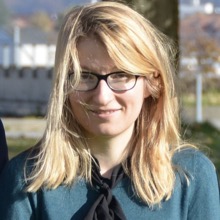WI2023 – Track: Human Computer Interaction & Social Online Behavior
Track description
Human Computer Interaction (HCI) and Social Media are interdisciplinary fields of research that deal with the analysis and design of human interactions with and through information and communication technologies (ICT). The goal is to positively influence usability and user experience and thereby increase productivity, quality of life and the well-being of the users. With the rapidly developing potentials of interactive technologies, sensor technology, intelligent real-time data processing and the almost universal presence of IT in all areas of life, new challenges and opportunities arise for HCI and social media research in the field of business informatics. The track “Human-Computer Interaction and Social Online Behavior” focuses on research that contributes to understanding and successfully designing the interaction of users with digital technologies as well as the interactions between humans on social media platforms. We are looking for contributions of any methodological orientation that make theoretically and practically relevant contributions to a better understanding and design of IS in the area of HCI or social media. Examples are human interactions with intelligent technologies such as Artificial Intelligence, novel (multimodal) interface designs including concepts for wearables and augmented/virtual reality, current HCI practices for the investigation and design of specific interactive systems. Moreover, we invite innovative ideas related to user behavior and perceptions on social media platforms. The track welcomes contributions that describe technically rigorous scientific advances in the field of HCI and social media with clear references to business informatics.
Track Topics
- Human interactions with intelligent technologies like artificial intelligence
- Psychological, social, cultural and ethical aspects of HCI in the design of information systems
- Novel (multimodal) interface designs including concepts for wearables and augmented/virtual reality
- Investigation and design of specific interactive systems, such as assistance systems, conversational agents, persuasive systems, or physio-adaptive systems
- Using NeuroIS methods and tools in HCI
- Participatory design and methods in HCI
- Social, individual and enterprise value of the social media application
- User behavior on social media platforms
- Social Media, Health and Well-Being
- Bias and Discrimination on Social Media
- Cyberbullying and Digital Aggression on Social Media
Track Chairs

Hanna Krasnova
Universität Potsdam
Hanna Krasnova is a Professor for Information Systems, especially Social Media and Society at the University of Potsdam, and a Director of the Weizenbaum Institute for the Networked Society – the German Internet Institute in Berlin, Germany (www.weizenbaum-institut.de). In her research, she mainly investigates the implications of Social Media use on individuals and society. Hanna Krasnova is the author of over 60 research articles, which appeared in the Information Systems Research (ISR), PLOS ONE, European Journal of Information Systems (EJIS), Journal of Strategic Information Systems (JSIS), Journal of Information Technology (JIT), and other leading IS conferences and journals.

Jella Pfeiffer
Justus-Liebig-Universität Gießen
Jella Pfeiffer is Professor for Digitalization, E-Business and Operations Management at the Justus Liebig University Giessen. Before, she received her PhD in Information Systems and worked as Post-Doc at the Karlsruhe Institute of Technology and the Johannes Gutenberg University Mainz. She was also manager of the Karlsruhe Decision & Design Lab (KD²Lab). Her research on decision support systems and digital assistants in e-commerce, VR-commerce and e-participation and her works on experimental research have been published in Information Systems Research, Journal of Management Information Systems, Journal of the Association for Information Systems, Journal of Behavioral Decision Making, European Journal of Operational Research, and others.

Alexander Maedche
Karlsruher Institut für Technologie
Alexander Maedche is a full professor of information systems at the Karlsruhe Institute of Technology (KIT), Germany. His research focuses on designing interactive intelligent systems, such as conversational agents, business intelligence & analytics systems, eye-based interactive systems, physio-adaptive systems and human-centered systems engineering. He publishes in leading information systems and computer science conferences and journals such as MIS Quarterly, Journal of the Association of Information Systems, Business & Information Systems Engineering, Information & Software Technology, Computers & Human Behavior, International Journal of Human-Computer Studies, IEEE Transactions on Software Engineering, IEEE Intelligent Systems, VLDB Journal, and AI Magazine, among others. As the executive director of the non-profit association Usability & User Experience in Germany e.V., he is also dedicated to the transfer of knowledge at the intersection of information systems and human-computer interaction into practice.

Ulrich Gnewuch
Karlsruher Institut für Technologie
Ulrich Gnewuch is a Postdoctoral Researcher at the Institute of Information Systems and Marketing at Karlsruhe Institute of Technology (KIT). He studied Information Systems at the University of Mannheim and received his PhD degree from KIT. His research focuses on the design of conversational user interfaces and digital assistants. His research has been published in journals such as Business & Information Systems Engineering, Computers in Human Behavior, and International Journal of Human-Computer Studies, and presented at major IS conferences. He serves as a board member and vice chair for teaching resources of the AIS Special Interest Group on Human-Computer Interaction (SIGHCI).
Associate Editors
- Olga Abramova, Universität Potsdam
- Annika Baumann, Universität Potsdam & Weizenbaum Institute for the Networked Society
- Benedict Bender, Universität Potsdam
- Benedikt Brendel, TU Dresden
- Constantions Coursaris, HEC Montreal
- Sara D’Onofrio, Genossenschaft Migros Zürich
- Tatiana Ermakova, Fraunhofer FOKUS & Weizenbaum Institute for the Networked Society
- Thomas Fischer, Johannes Kepler Universität Linz
- Fenne große Deters, Universität Potsdam
- Michael Knierim, Karlsruher Institut für Technologie
- Antonia Kösler, Universität Potsdam
- Dana Naous, University of Lausanne
- René Riedl, Johannes Kepler Universität Linz
- Marten Risius, University of Queensland
- Björn Ross, University of Edinburgh
- Anna-Maria Seeger, Universität Mannheim
- Dominik Siemon, LUT University
- Gunnar Stevens, Universität Siegen
- Navid Tavanapour, Universität Hamburg
- Gergana Vladova, Universität Potsdam
- Amina Wagner, TU Darmstadt
- Markus Weinmann, Universität zu Köln
